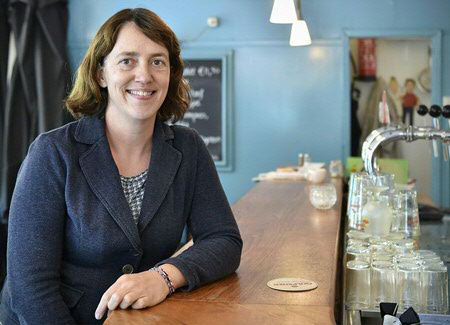More sociable after a glass of beer? Is that even really true?

People tend to believe that alcohol makes them more sociable, but is it the truth? Researcher and lecturer at the UG’s department of Psychology, Marije aan het Rot, plans to get to the bottom of it. The Knowledge Institute for Beer awarded the professor a €5,000 grant to help fund her research.
At the beginning of this year, you received a grant for research into the effects of alcohol on empathetic behaviour. What exactly will you be studying?
Until now, research into the effects of liquor on behaviour has been mainly experimental, and little is known about the effects of beer in particular. Due to the fact that people might have different expectations of how liquor and beer affect our behaviour, I am interested in finding out more about the effects of beer specifically. I am interested in empathy in particular, because people tend to believe that they become more sociable after drinking alcohol and that may or may not be true.
You have previously conducted research into this topic. What were your results at that time?
That’s right, in that study we researched the effects of liquor on one aspect of empathy, namely accuracy in reading the emotions of others. The more alcohol that was consumed, the faster this ability deteriorated, particularly among men who were not used to drinking a lot. Women were left out of my previous study, but will be included in the new one.
You received €5,000 from the Knowledge Institute for Beer – what will you be spending this grant on?
Beer! No haha, just kidding. I have calculated that we will be spending no more than 10% of this amount on actual beer. The bulk of the money will go towards a participant’s allowance. I would like to offer all participants a small financial reimbursement for the time dedicated to this study. The beer drinking part and the measurements will not take long, but of course it would be irresponsible of us to send intoxicated participants straight home. So, they will stay in the lab until their blood alcohol level drops to below the legal limit for traffic participation. In order to accurately measure blood alcohol levels, I will also be purchasing a breathalyser. Oh, and pregnancy tests, because from an ethical standpoint I need to be 100% sure that I am not giving alcohol to pregnant women.

The original start date for my study was January 2021. I am currently supervising a Romanian PhD student who is completing a double degree programme and the idea is that she will come here for six months to do her research, aided by Bachelor’s and Master’s students of Psychology at the UG. For the time being, we are completing our preparations according to the original schedule and with the same start date in mind, but of course nothing is certain yet. In the event that the Psychology labs close again due to measures to limit the spread of the coronavirus, then I will ask the Knowledge Institute for Beer for a deferment and the students will have to do something else.
Is your study part of a larger project?
Isabelle Bulai, my PhD student, is studying the effects of alcohol on social cognition. In other words, the ability to study social situations and others while under the influence. When I received a grant for my beer study, we agreed to add my research to her study.
During and after your studies, you spent time living in the cities of Montreal, New York and Groningen. Do you have a favourite?
I completed my PhD programme in Montreal and worked in New York as a postdoc before applying for this position in Groningen. All three of these cities are now a part of me, as is Maastricht, where I went to university, and Tilburg, where I went to secondary school. I was in my twenties when I lived in Montreal and thanks to my amazing supervisors, I learned a lot about neuroscience, psychiatry and psychology. By the time I moved to New York I was in my thirties, and I spent a lot of time getting to know myself in a period that I knew would be temporary. I really learned how to live day by day. Now I’m in my forties and I feel completely at home here, partially due to a fun and challenging position at the University of Groningen.
And last but not least, do you have a favourite alcoholic beverage and how does it affect your behaviour?
No, I don’t have a favourite alcoholic beverage, but I do have a favourite occasion for having a drink: with my friends! Thankfully I have lots of fond memories of fun nights with friends drinking beer (Maastricht), wine (Montreal), or a cocktail (New York) and still enjoy a drink or two of all of the above on occasion. In terms of the effects, I already know that I behave differently socially, but this will depend on the occasion and the amount of alcohol that I consume, of course. I think that my friends and family would say that I become a bit chattier. But of course this is also based on a situation in which they themselves are probably drinking, so I wonder how accurate their observations really are.
For more information
| Last modified: | 22 September 2020 10.45 a.m. |
More news
-
15 April 2025
Impact gaswinningsproblemen op Groningers: negatieve ontwikkeling zet niet door, maar meerdere keren schade blijft een punt van zorg
Impact gaswinningsproblemen op Groningers: negatieve ontwikkeling zet niet door, maar meerdere keren schade blijft een punt van zorg
-
17 March 2025
Liekuut | The high price of conflicts
According to Carsten de Dreu, Professor of Foundations of Cooperation and Social Organization at the University of Groningen, a lot can be learned from conflicts.
-
10 March 2025
Science for Society | Memory Lab for higher marks
Learning facts at school is something hardly anyone likes. The day before a test, pupils cram as many words or names as possible into their heads, only to hopefully remember them the next morning and then forget them again after the test.
